#Dumuzid
Text
The flowers of Tammuz, […] shall I hand them over to him in the underworld twilight?
— Badr Shakir al-Sayyab, Placing the Poet: Badr Shakir al-Sayyab and Postcolonial Iraq, compiled by Terri DeYoung, (1998)
#Iraqi#Badr Shakir al-Sayyab#Placing the Poet: Badr Shakir al-Sayyab and Postcolonial Iraq#Terri DeYoung#(1998)#Essence#Tammuz#Dumuzid#♥
24 notes
·
View notes
Text

whoop i was also doodling random peep because . i draw.
27 notes
·
View notes
Text

Ah yes, my favourite fandom —Mesopotamian mythology.
Anyway, I’m just making Gilgamesh-themed board game for my university, so now I’m spending all my time reading Samuel Kramer and listening to old Mesopotamian songs. It’s a really strange experience because while fandom is like…Dead…For centuries…
Ishtar (Inanna) and Dumuzid, my favourite hetero ship (I wanna eat pavement).
Inspired by Meat Loaf’a song “I’d do anything for love (But I won’t do that)”, it fits them soooo well.
#ancient sumeria#sumerian mythology#mesopotamian mythology#Inanna#Ishtar#Dumuzid#I’m not insane please LISTEN
108 notes
·
View notes
Text

Apollo - Dumuzid - Chaldean Sheep Set by 3 Shoku Okowa
#apollo#dumuzid#3 shoku okowa#anime figure#figure collecting#fate#fate series#fate grand order#fgo#fate go#garage kit
48 notes
·
View notes
Text

posting my precious boy everywhere
18 notes
·
View notes
Text

Inana’s Descent
Full Myth: http://etcsl.orinst.ox.ac.uk/section1/tr141.htm
Inana instructs Ninšhubur to lament for her death when she goes to Kur. Then if she does not return she should go and ask the great Gods for help (Going to Enlil, Nanna, then Enki) to save her. Lamenting and mourning in Mesopotamia was an extremely important cultural ritual.
Inana says to Ninšubur:
“On this day I will descend to the underworld. When I have arrived in the underworld, make a lament for me on the ruin mounds. Beat the drum for me in the sanctuary. Make the rounds of the houses of the gods for me. Lacerate your eyes for me, lacerate your nose for me. (1 ms. adds the line: Lacerate your ears for me, in public.) In private, lacerate your buttocks for me. Like a pauper, clothe yourself in a single garment.”
When Inana is returning from Kur demons follow, Galla. Contrary to neo-pagan and Jungian analysts claims this is not an empowering Goddess story. Inana has lost, she is defeated, and she must give a substitute to Kur if she wishes to live. The demons follow her and as she visits each person upon her return they do the following:
“[Name] threw himself at her feet. He had sat in the dust and clothed himself in a filthy garment. The demons said to holy Inana: “Inana, proceed to your city, we will take him back.”
Due to the person lamenting correctly she gives a reason to the Galla to not take that person, [Spelling used by the ETCSL]:
Nincubura— is her faithful minister of trustworthy words
Cara— her singer, manicurist, and hair dresser
Lulal— follows her at her right and her left
Then they come to Dumuzid. Unlike the other three who have lamented correctly by wearing a filthy garment and sitting in dirt, Dumuzid has worn a luxurious garment and sat on a throne.
“There was Dumuzid clothed in a magnificent garment and seated magnificently on a throne. The demons seized him there by his thighs. The seven of them poured the milk from his churns. The seven of them shook their heads like ……. They would not let the shepherd play the pipe and flute before her (?). She looked at him, it was the look of death. She spoke to him (?), it was the speech of anger. She shouted at him (?), it was the shout of heavy guilt: “How much longer? Take him away.” Holy Inana gave Dumuzid the shepherd into their hands.”
In essence, three of the people she held dear lamented for her but she found the one she cherished even more deeply, had not done so. She was angry and hurt, thus gave him to the Galla instead of finding a reason not to. He escapes and hides.
Despite her anger she still laments for the one she loves. This myth is what people use to toss Inana & Dumuzid’s love to the side... yet she is lamenting her loss
“Holy Inana wept bitterly for her husband. […] She tore at her hair like esparto grass, she ripped it out like esparto grass. “You wives who lie in your men’s embrace, where is my precious husband? You children who lie in your men’s embrace, where is my precious child? Where is my man? Where ……? Where is my man? Where ……?"”
A fly helps her find Dumuzid and his sister G̃eštinana, the myth ends there:
“Now, alas, my ……. You for half the year and your sister for half the year: when you are demanded, on that day you will stay, when your sister is demanded, on that day you will be released.” Thus holy Inana gave Dumuzid as a substitute ……. Holy Erec-ki-gala – sweet is your praise.”
Ištar’s Descent
Ishtar’s myth is shorter and not as clear, my translation is from The Ancient Near East An Anthology of Texts and Pictures edited by James Pritchard. Ištar's descent begins on page 77:
"Sprinkled Ishtar with the water of life and took her from her presence.
When through the first gate he had made her go out, He returned to her the breechcloth for her body.
When through the second gate he had made her go out, He returned to her the clasps for her hands and feet.
When through the third gate he had made her go out, He returned to her the birthstone girdle for her hips.
When through the fourth gate he had made her go out, He returned to her the ornaments for her breasts.
When through the fifth gate he had made her go out, He returned to her the chains for her neck.
When through the sixth gate he had made her go out, He returned to her the pendants for her ears.
When through the seventh gate he had made her go out, He returned to her the great crown for her head.
"If she does not give thee her ransom price, bring her back. [Footnote 93]
As for Tammuz, the lover of her youth,
Wash him with pure water, anoint him with sweet oil;
Clothe him with a red garment, let him play on a flute of lapis.
Let courtesans turn [his] mood."
[When] Belili was stringing] her jewelry, [And her] lap was filled with "eye-stones,"
On hearing the sound of her brother, Belili struck the jewelry on [...]
[Foot note 93] This continuation of Ereshkigal's instructions appears to be out of place here, as regards the Ninevah version. The older Ashur vesrion speaks of the ransom before Ishtar is led away. The mention of Tammuz is likewise startling in this context. There is no indication in the Sumerian version- contrary to earlier assumptions that Tammuz had gone down to the nether world. The concluding part of the myth, therefore, will remain obscure in its allusions so long as additional material is not available."
I have no further information on Tammuz's situation. There may be newer material available I simply haven't researched it further.
-🔹-
This is a repost I believe in relation to a post where I defend Inana's love for Dumuzid.
#polytheism#paganism#landof2rivers#inana#inanna#ishtar#ištar#dumuzi#dumuzid#inana and dumuzid love each other#fucking fight me#dont i dont have the energy but i will eventually hunt down that post#sumerian#akkadian#mesopotamian#mythology#myth#queue#repost
6 notes
·
View notes
Text



Inanna, Mesopotamian goddess of love and war.
Ninshubur, Inanna's divine attendant.
Dumuzi, god of shepherds, and Inanna's husband.
11 notes
·
View notes
Text

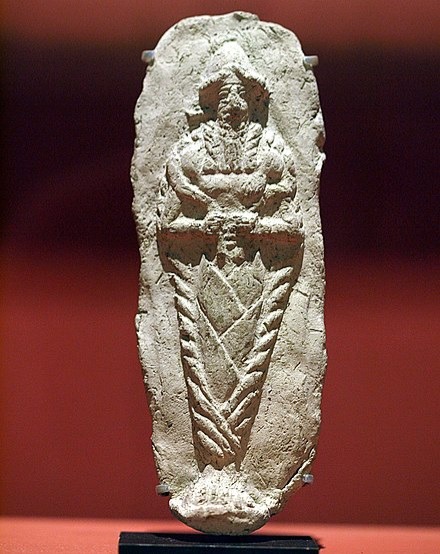

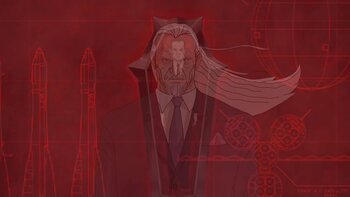
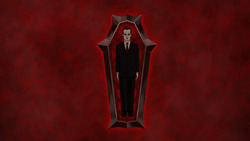


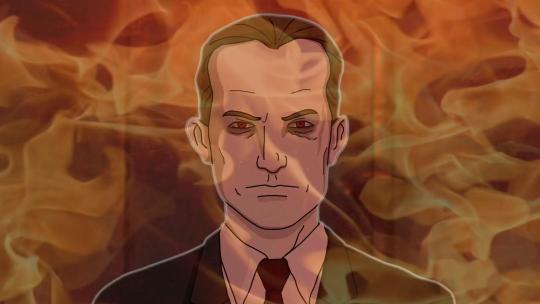


"Terracotta plaque dating to the Amorite Period (c. 2000-1600 BC) showing a dead god (probably Dumuzid) resting in his coffin [...] A collection of lamentations for Dumuzid entitled In the Desert by the Early Grass describes Damu, the 'dead anointed one,' being dragged down to the Underworld by demons, who blindfold him, tie him up, and forbid him from sleeping. Damu's mother tries to follow him into the Underworld, but Damu is now a disembodied spirit, "lying in" the winds, "in the lightnings and in tornadoes". Damu's mother is also unable to eat the food or drink the water in the Underworld, because it is 'bad.' Damu travels along the road of the Underworld and encounters various spirits. He meets the ghost of a small child, who tells him that it is lost; the ghost of a singer agrees to accompany the child. Damu asks the spirits to send a message to his mother, but they cannot because they are dead and the living cannot hear the dead's voices. Damu, however, manages to tell his mother to dig up his blood and chop it into pieces. Damu's mother gives the congealed blood to Damu's sister Amashilama, who is a leech. Amashilama mixes the congealed blood into a brew of beer, which Damu must drink in order to be restored to life. Damu, however, realizes that he is dead and declares that he is not in the 'grass which shall grow for his mother again,' nor in the 'waters which will rise.' Damu's mother blesses him and Amashilama dies to join him in the Underworld. She tells him that 'the day that dawns for you will also dawn for me; the day you see, I shall also see,' referring to the fact that day in the world above is night in the Underworld.'"
#dumuzid#damu#adonis#inanna#tammuz#sumerian#prophecy#metalocalypse#dethklok#the dead man#charles foster offdensen#cfo#the church of the black klok#selacia#classic art#wikipedia#research#mythology#spiritual saviors#omnism
13 notes
·
View notes
Text
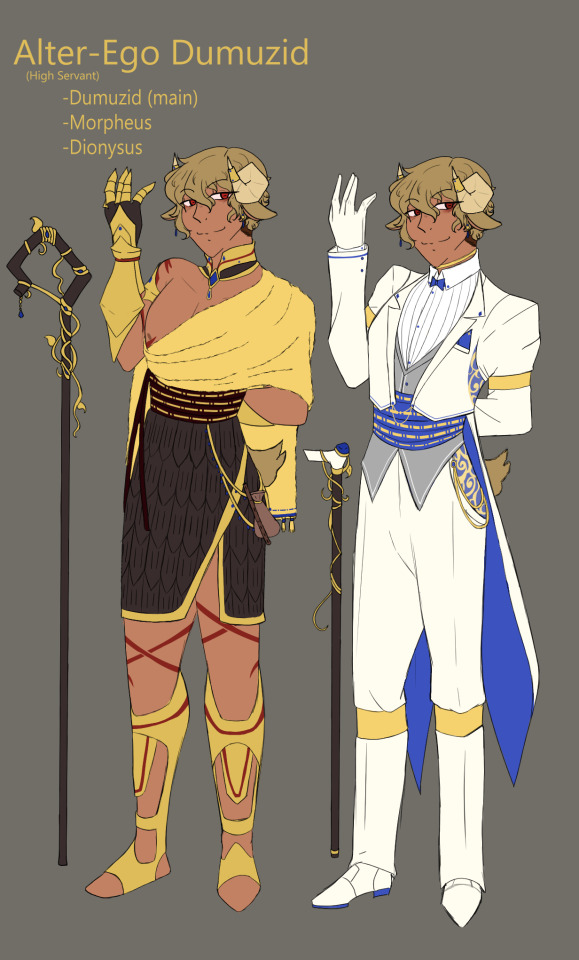

Redesigned my Dumuzid I had in the works for a while but recent events... made me want to finish him.
His 1st ascension is just the sheep, 2nd is human, and 3rd is literally bc I've seen so many say he has suit vibes lmaoo
#yes it's a niyo event#i'll share more later#fanservant#fan servant#dumuzi#dumuzid#fate dumuzid#alter ego dumuzid#fgo#fate go#fate grand order#fgo oc#neo art#character art
79 notes
·
View notes
Text

NOW THATS THE DUMUZID WE DESERVED
Anyway
Dumuzid, rider class
#my art#fate grand order#dumuzid#He can transform into his sheep self#yes#if you think he looks like shirou? thats the point#for once i will do shirou/rin content by making ishtar's husband be a shirouface#but beefier
23 notes
·
View notes
Quote
O House of the Underworld, your vault gives shelter.
Enheduanna, Enheduana: The Complete Poems of the World’s First Author
19 notes
·
View notes
Text
A song of Inana and Dumuzid (Dumuzid-Inana C1)

Segment A
Lines 1–10: 2 lines fragmentary
Ninegala, your wedding ushers are lords! ...... like someone cracking eggs ....... Inana, your ushers are lords! ...... is first, ...... is second,
1 line fragmentary
the fowler ......, and the fisherman from the depths of the reed-beds.
Lines 11–20: "I will send a messenger to the shepherd: let him treat me to the best butter and the best milk! I will send a messenger to my farmer: let him treat me to ...... and wine! I, the lady, will send a messenger to the fowler, whose bird-nets are spread out: let him treat me to fine birds! I, Inana, will send a messenger to the fisherman too whose nets are set up in the reed-beds: let him treat me to fat carp!"
Lines 21–32: One of her ushers brought the gifts. The fowler brought choice birds, and the fisherman brought fat carp and put them ...... my lady. The shepherd carried butter in his hands, Dumuzid carried milk on his shoulders. He carried butter and milk in containers on his shoulders, he carried milk in the churn on his shoulders. ...... called out to the house; Dumuzid ......: "Open the house, my lady! Open the house!"
1 line fragmentary
approx. 4 lines missing
Segment B
Lines 1–11: The mistress ....... She stepped forward to her own mother, and stood ...... expert in song: (Ningal speaks:) "He will be just like ....... He will be just like ....... He will be just like ...... for you. He will be just like your father. He will be just like your mother. His mother too will ...... just like your mother! His father too will ...... just like your father!" (Dumuzid speaks:) "Open the house, my lady! Open the house!"
Lines 12–23: At her mother's bidding, Inana bathed in water and anointed herself with sweet oil. She covered her body with a grand robe; she also took her pin. She straightened the lapis lazuli stones on her neck, and grasped her cylinder seal in her hand. The young lady stepped forward as Dumuzid pushed open the door, and like a moonbeam she came forth to him from the house. He looked at her and rejoiced in her; he embraced her and kissed her.
1 line fragmentary
approx. 9 lines missing
Segment C
Lines 1–8: 1 line fragmentary
Dumuzid ....... Lord Dumuzid ....... "My master, ...... home. My master, my spouse ....... Dumuzid ....... My master, take me (?) into the house." The shepherd Dumuzid said to his bride:
Lines 9–13: "My bride, come forth from the ....... Inana, ...... the house of my personal god. I shall bring you to the house of my god. I shall get you to lie down before my god and, Inana, you shall sit with me in my god's seat of honour!"
Lines 14–24: When he had spoken thus to her, she sat down ......
1 line fragmentary
...... stepped forward ....... ...... uttered a prayer ......
5 lines fragmentary
...... your usher ......
approx. 4 lines missing
Segment D
Lines 1–4: 1 line fragmentary
...... before you ....... My Ama-ucumgal, ...... boat. ...... the young lady:
Lines 5–13: "I have not carried you off to be my slave girl! ......, your table will be a splendid table. You will eat at a splendid table. Your table will be a splendid table, a splendid table. You will eat ....... My mother does not eat there, Durtur's brother does not eat there, my sister Jectin-ana does not eat there; but you will eat .......
Lines 14–27: "My bride, you should not weave cloth for me! ......, you should not spin yarn for me! ......, you should not comb out goat's wool for me! ......, you should not warp threads for me!"
3 lines fragmentary
"You should not (?) ...... bread for me!" Ninegala, ....... The wild bull Dumuzid ....... ...... holy radiance on the horizon ......., ...... radiance in heaven ......,
2 lines fragmentary
up to 5 lines missing
3 notes
·
View notes
Text
Samuel David. The Red Shepherd: Towards a New Image of Dumizid. Collector's Edition. 192 pages. Limited to approx. 1000 copies. Illustrations by Rowan E. Cassidy and Joseph Uccello.
Shop link in bio.
instagram
1 note
·
View note


